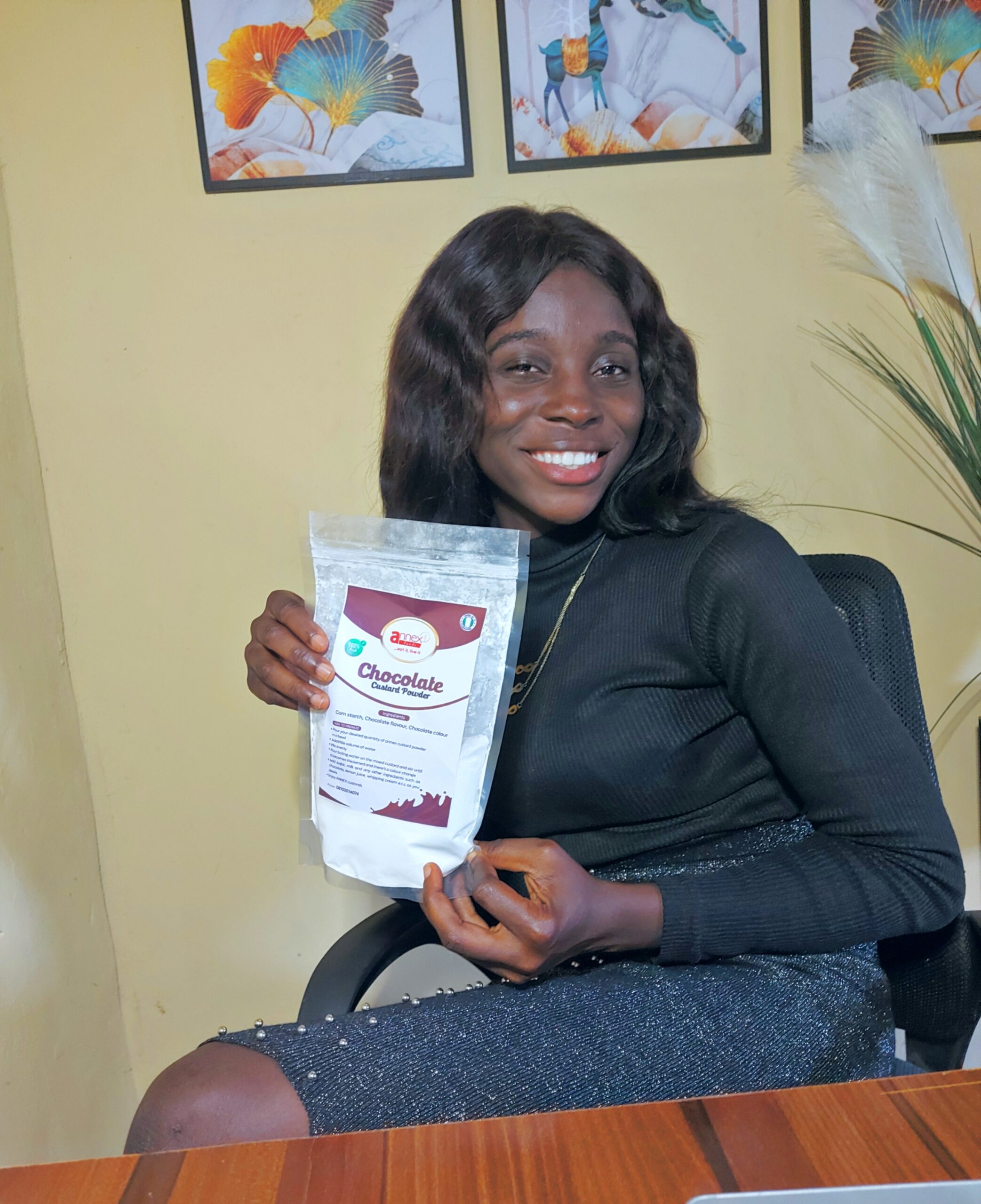As a fresher in Moshood Abiola Polytechnic, Blessing Adepoju attended many different trainings and meetings, including the church’s fellowship.
“The journey started in 2015 when we had a Brothers and Sisters conference where a tutor taught the participants how to make custards. I didn’t pay much attention then,” Blessing recounted.
During one of her school courses in Food Science Technology, Blessing participated in a practical session to apply the knowledge received in her early days in the institution.
“While in school, there was an expectation for us to produce food. This prompted my venture into learning about entrepreneurship and food processing.
She went further to reference one of the projects she participated in. “Also in my second year of National Diploma, we were grouped and tasked with producing food. I proposed to my group that we make custard, drawing from my prior knowledge, albeit imperfect. Fortunately, we earned recognition, marks and made money by selling it to our fellow students,”she shared.
After the event, Blessing never thought of making food products, she didn’t bother with continuing the venture after her practical year at the polytechnic.
As the coronavirus ripped through the world in the first half of 2020, Blessing, having completed her higher diploma, became frustrated as she contemplated different career paths.
According to a 2022 research by the Stutern team, 22.58% of Nigerian women are largely unemployed. This reality dawned on Blessing to begin to think of ways to utilize her knowledge before going for the compulsory, National Youth Service Corps (NYSC). Blessing became determined not to be part of the unemployed women.
“After school, I was thinking of what I could do for myself based on what I studied in school, which is Food science technology. But I went into fashion designing first,” Blessing said.
Although she had a penchant for making food, she wasn’t sure how to start. Soon she drew inspiration from one of her friends who was already making money from selling snacks. She felt like she had received a divine nudge to start her business.
Blessing began producing food by the later months of 2020. Her company, Annex Foods, now registered with the Corporate Affairs Commission, churns out various mixes of custards, snacks and chips, and zobo drinks.
Blessing is now recognized as one of the few female entrepreneurs breaking stereotypes and improving the consumption of Nigerian-made food. A report by the Fate Foundation Research reckons that women make up as high as 43% of entrepreneurs in Nigeria even though most businesses are operated by men (57% of respondents). The relative gender gap in entrepreneurship, measured as the ratio of female to male entrepreneurs, is therefore placed at 0.75.
“Currently, we have more than 600 customers spread across states in the North-central and Southwest of the nation,” she said.
In 2022, the National Bureau of Statistics (NBS) reported a decrease in food import business transactions in 2022, amounting to over N1.9 trillion compared to the N2 trillion spent on food importation in 2021. Small-food companies like Annex Food help to curb the rate of food importation into the nation.
Quantity over Quality
Blessing didn’t always have it easy, especially at the initial stage.
Many people in her environment doubted her ability to produce custards independently. As she said, “People around me found it hard to believe I could produce and package it by myself. They looked down on my potential to produce food products from scratch, they believed only big companies could achieve it.”
According to her, her first customers aside from her parents purchased it merely to evaluate and test the product, “But surprisingly, the same people who thought the product was nothing and showed no interest, came back for more.”
In addition, marketing and manpower pose challenges for Annex Foods, as a small business. Earning trust in the products requires extensive marketing efforts given that this product is what people consume, which she made conscious moves on. Annex also encountered challenges in trying to recruit people into the company; she needed to pay them, necessitating thorough planning to not alter the sustenance.
Blessing’s training in food science has significantly influenced her product. But people want quantity more than quality, she said.
Using the chips she produces as an example, she explained, “I don’t add coloring to my chips and sugar. Despite how good it tastes, people want it colored and sweet. However, I am aware that coloring and sugar may not be healthy for the body. Despite their expectations for me to follow the conventional approach, even when I emphasize its lack of healthiness, I cannot produce something that I wouldn’t consume and could potentially harm others.”
Blessing Adepoju's journey began as a freshman at Moshood Abiola Polytechnic where she learned about making custard during a Brothers and Sisters conference in 2015. Her studies in Food Science Technology furthered her practical knowledge. In her second year, she proposed and successfully executed a group project to produce custard, earning recognition and profit.
Years later, during the pandemic in 2020 and after completing her higher diploma, Blessing sought to apply her education and chose to venture into food production, inspired by a friend’s success in the snack business. She founded Annex Foods, producing various custards, snacks, chips, and zobo drinks. Her business is recognized for aiding in reducing food importation and promoting Nigerian-made products.
Blessing faced skepticism regarding her ability to produce quality food independently and challenges in marketing and manpower. However, her dedication and adherence to healthy practices in food production earned her a loyal customer base. Despite initial doubts, her quality-driven approach over quantity has been central to her philosophy and business growth.






